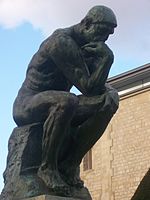Quietism (philosophy)
"[5][6] It has been described as "the view or stance that entails avoidance of substantive philosophical theorizing and is usually associated with certain forms of skepticism, pragmatism, and minimalism about truth.
The objective of quietism is to show that philosophical positions or theories cannot solve problems, settle debates or advance knowledge.
[12] There are a range of justifications for quietism about the realism debate offered by Gideon Rosen and John McDowell.
[15][16] The goals of Epicurean philosophy are the decidedly quietist objectives of aponia (freedom from pain) and ataraxia, even dismissing Stoic logic as useless.
Contemporary discussion of quietism can be traced back to Ludwig Wittgenstein, whose work greatly influenced the ordinary language philosophers.
[citation needed] Norman Malcolm, a friend of Wittgenstein's, took a quietist approach to skeptical problems in the philosophy of mind.
[citation needed] More recently, the philosophers John McDowell, Irad Kimhi, Sabina Lovibond, Eric Marcus, Gideon Rosen,[13] and to a certain degree Richard Rorty[21] have taken explicitly quietist positions.
